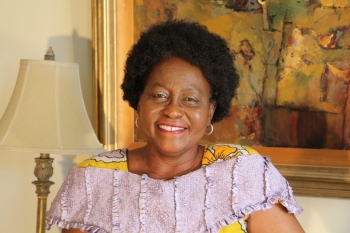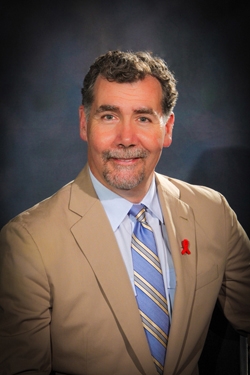SA to host AIDS 2016, HSRC CEO appointed co-chair of conference
DATE: 3 December 2013
South Africa to host the 21st International AIDS Conference (AIDS 2016)
International AIDS Society announces Durban, as site of the conference in July 2016
29 November 2013 (Geneva, Switzerland) – The International AIDS Society (IAS) announced today the selection of Durban, South Africa, as the host city of the 21st International AIDS Conference (AIDS 2016), the most important event for all those working in the HIV field, including scientists, policymakers, activists, political leaders, healthcare providers, people living with HIV and others committed to the global response to HIV and AIDS. AIDS 2016 will be held from 17-22 July 2016 at the Durban International Convention Centre (ICC) and is expected to bring together some 18 000 participants from around the world.
Human Sciences Research Council (HSRC) CEO Professor Olive Shisana, Honorary Professor at the University of Cape Town, Chair of the BRICS Think Tank Council and the receiver of the 2013 Academy of Science-for-Society Gold Medals for outstanding achievement in scientific thinking on HIV to the benefit of society has been appointed the AIDS 2016 Local Co-Chair. Professor Chris Beyrer, is the AIDS 2016 International Chair. He is IAS President-Elect and Professor of Epidemiology and International Health at the John Hopkins Bloomberg School of Public Health in Baltimore, Maryland.
This is the second time that Durban will be hosting the International AIDS Conference, having hosted the XIII International AIDS Conference in 2000.That conference was the first to be hosted in a developing country and enormously helped to change the approach to global public health. In response to the controversial views of some leaders from the South African Government at that time, the conference prompted the famous “Durban Declaration” signed by more than 5,000 scientists who confirmed the overwhelming scientific evidence that HIV causes AIDS. One year after the conference, Heads of States and Government Representatives met at the United Nations General Assembly Special Session dedicated to HIV/AIDS and issued the Declaration of Commitment on HIV/AIDS.
“AIDS 2000 represented a real watershed and we are confident that AIDS 2016 will mark another milestone in the history of the HIV epidemic both at a national and international level”, said Prof. Beyrer. “Despite the remarkable progress South Africa has made in recent years in prevention and treatment of HIV and the sharp increase of domestic spending in HIV, it is still the country most affected by the epidemic in the world. Holding the conference in Durban will undoubtedly have a deep and lasting impact on one of the most important challenges of South Africa and Sub-Saharan Africa. At the same time, AIDS 2016 will also focus on the huge progress that the country has made since AIDS 2000”.
Prof. Shisana said, “I look forward to working with many scientists to enable researchers to showcase progress that Africa has made in managing the HIV/AIDS epidemics. Many lessons will be shared in the successful management of HIV and AIDS. This event will provide an opportunity to show how much progress South Africa has made in implementing and funding evidence-based prevention and treatment interventions. With its large HIV/AIDS epidemic, South Africa offers an opportunity for conducting research the results of which may benefit other countries."
According to the Joint United Nations Programme on HIV/AIDS (UNAIDS), in 2012 South Africa registered 370,000 new HIV infections, a tremendous drop from the 640,000 new infections registered in 2001. Also, between 2009 and 2012, new HIV infections among children declined by 63% in the country and the rate of mother-to-child transmission of HIV at six weeks declined to 2.1% in 2012 compared to 22% in 2005. Where antiretroviral therapy has been scaled up, clear health gains have resulted. In 2011, life expectancy in the KwaZulu-Natal province of South Africa was 11.3 years higher than in 2003, when HIV treatment scale-up began.
Durban was selected to host AIDS 2016 following an evaluation of candidate cities conducted by the IAS Governing Council according to three main criteria: impact on the epidemic, sufficient infrastructure, and freedom of movement and travel for people living with HIV. According to a policy of non-discrimination first adopted by the IAS Governing Council in 1992, the IAS will not hold its conferences in countries that restrict short term entry of people living with HIV, and/or require prospective HIV-positive visitors to declare their HIV status on visa application forms or other documentation required for entry into the country.
The International AIDS Conference was previously held in Vienna, Austria (2010), Washington, D.C., USA (2012), with the next one to be held in Melbourne, Australia, 20 – 25 July 2014.
AIDS 2016 Conference Organisers
AIDS 2016 is convened by the IAS and permanent partners: the Global Network of People Living with HIV (GNP+); the International Council of AIDS Service Organizations (ICASO); the International Community of Women with HIV/AIDS (ICW), and the Joint United Nations Programme on HIV/AIDS (UNAIDS).
END
About the IAS
The International AIDS Society (IAS) is the world's leading independent association of HIV professionals, with over 16,000 members from more than 196 countries working at all levels of the global response to AIDS. The IAS members include researchers from all disciplines, clinicians, public health and community practitioners on the frontlines of the epidemic, as well as policy and programme planners.
The IAS is custodian of the biennial International AIDS Conference, which will be held in Melbourne, Australia, 20-25 July 2014 and lead organiser of the IAS Conference on HIV Pathogenesis, Treatment and Prevention, which will be held in Vancouver, British Columbia, Canada, 19-22 July 2015.
www.iasociety.org | www.aids2014.org | www.ias2015.org
For more information:
Sian Bowen (Geneva, Switzerland)
Senior Manager, Communications, IAS and AIDS 2016
Email: Sian.Bowen@iasociety.org
Tel: +41 22 710 0864
Francesca Da Ros (Geneva, Switzerland)
Communications and Media Officer, IAS and AIDS 2016
Email: Francesca.Daros@iasociety.org
Tel: +41 22 710 0822


